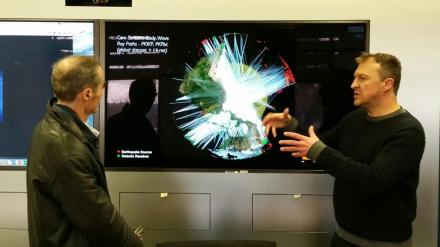
|
|
Director's Message
Dear RSES,
Steve is away at present, visiting institutions in China with the Vice Chancellor. We welcomed Prof. Kiaran Kirk to RSES during the past week and thank you to all who met with him. He indicated to me that he really enjoyed his all-too-brief visit to RSES (and that we provided him with dinner conversation topics for that evening!)
I would like to make you all aware that ANU has a scheme whereby financial support is available to contribute to carer costs for people attending conferences and career development activities. Thanks to Meghan Miller for providing the details in this newsletter.
Finally, ARC rounds for Laureate and Future Fellowships will be opening soon. Please think carefully about potential applicants who would align well with our strategic directions and would enhance our research and teaching activities.
Paul Tregoning
|
|
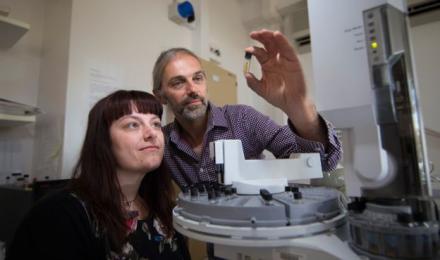
|
|
World Wide News:
We had a major news item that went around the world “The Rise of Algae in Cryogenian oceans and the emergence of animals”.
YouTube Video produced in collaboration of RSES, the ANU outreach team and the Australian Academy of Sciences >> Video
Nature Podcast >>Read more
ABC RN Breakfast Radio Show >> Read more
BBC News – “The algae that terraformed Earth” >> Read more
The Washington Post “The first animals evolved during the absolute worst time on Earth”>>Read more
Independent – “Mystery of how first animals appeared on Earth 'solved' by scientists”>>Read more
The Atlantic “The Origin Story of Animals Is a Song of Ice and Fire”>>Read more |
|

|
|
Carer support for travelling staff members:
The ANU recognizes that many staff have carer responsibilities that may limit access to career development opportunities. The university has created a fund that is aimed at supporting staff participation in national or international workshops or conferences. This can support costs if the dependent accompanies the staff member interstate or overseas (such as child care at conference venues), or where alterative care needs to be arranged while the staff member will be absent from home.
Eligible applicants can apply for up to $1000 in funds, once a year. Details of eligibility, assessment criteria and assessment process and the application form can be found here:
Applications should be emailed to staffdiversity@anu.edu.au at least 8 weeks prior to the event.
Meghan Miller |
|
Staff Vs Students: Friday September 22nd - 2pm Kick off - Willows Oval |

|
As is often the case at this time of year, RSES’ students have challenged the staff to a game of football (some of you may incorrectly call this soccer)
Will this be the student's year? Apparently, there is so much talent in their squad this time round, is the staff’s exemplary record may be under threat?
Team registration via email:
Students: Louise.Schoneveld@anu.edu.au
Staff: Rhodri.Davies@anu.edu.au
"GAME ON" |
|
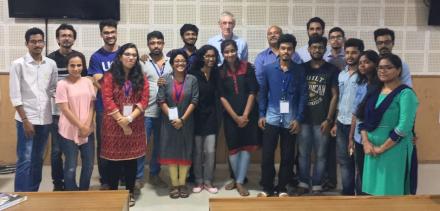
|
|
Intensive Isotopes
Over an jam-packed five days in the first week of September, Prof. Ian Williams taught the entire RSES 2nd year Isotope Geochemistry course, plus supplementary lectures on SHRIMP, to a rigorously selected group of postgraduate students from some of the top universities in India.
The intensive course, run at the Indian Institute of Technology Roorkee, was part of the Indian government’s Global Initiative of Academic Networks (GIAN) program, under which international specialists are brought to India as guest lecturers.
The course taught by Prof. Williams, “Sensitive High Resolution Ion MicroProbe (SHRIMP) applications of isotope geochemistry in Earth System Science”, consisted of 15 90-minute lectures and 5 2-hour practicals, at the end of which the students sat a tough formal examination. In a remarkable performance, indicative of the high quality of the best of the best Indian geoscience students, scores in the exam reached > 80%.
There is a large and growing interest in the SHRIMP within the Indian geoscience community, with several institutes, including the Indian government, planning to purchase SHRIMPs from the ANU over the next few years. This course helped to prepare some of the best young Indian scientists for the arrival of SHRIMP in their home country. |
|
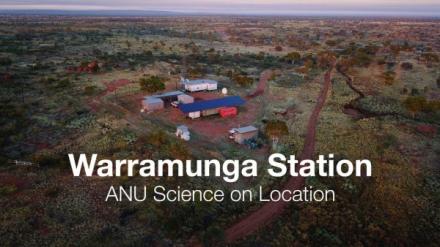
|
|
Scientists keep eye on North Korea's nuclear tests from the outack
It takes a very long time to get to a place where you can hear very little.
And it also takes a very long time to get to a place where you can hear something very big. Nuclear explosion big. >>>> read more and here
|
|
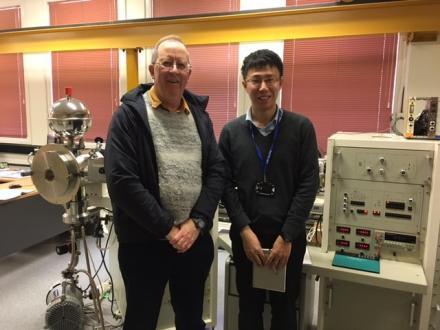
|
|
Alumnus, Phil Creaser supports Chinese student
Phil Creaser has generously given $5,000 to assist Yankun Di, an undergraduate student from Peking University (School of Earth and Space Sciences) with his research project. Earlier this year RSES and PKU signed an agreement to encourage greater collaboration between staff and students. “This is an exciting opportunity for some of the best Chinese undergraduate students to work with our scientists on a short intensive research project,” said Director of RSES, Professor Steve Eggins. Phil met Yankun at RSES and spent time learning about his project. |
|
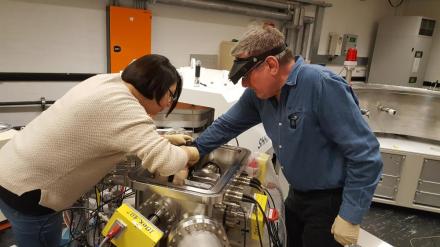
|
|
Shrimp Upgrade
Janaina Avila and David Thomson upgrading Faraday cup detector system on SHRIMP SI. The upgraded system allows for better beam focus and alignment for four isotope Sulphur analysis. |
|
|
Data Science Events:
The RSES Data Science Research Theme is launching a new series of events, starting next Monday (September 18th). We hope to stimulate further interest in data science in the school, as well as promote the use of cutting-edge data science and machine learning techniques within the earth sciences.
A talk or meeting will occur in the Hales Room every Monday at 11:30. There are two distinct strands, in alternating weeks:
Data Science Research Forums (starting 18/9): A mixture of seminars, tutorials and problem-sharing focussed on research in data science and its application to the earth sciences.
Data Surgeries (starting 26/9): Aimed at PhD students, an opportunity to discuss any data analysis problems they are facing, and get advice on appropriate tools, techniques and strategies.
Each session will last around an hour, and we hope that people will join us in for lunch in Fellows afterwards to continue the discussions. >> Read more |

|
|
|
|
ANU Education Grants scheme.
Applications are now open for Round 1 of the 2018 ANU Education Grants scheme.
Funding is offered for the ANU Vice-Chancellor's Teaching Enhancement Grants (ANUTEG) which support innovative and creative teaching initiatives and projects, and are linked to improving coursework student learning at undergraduate or postgraduate level.
Funding is also offered in this round for the ANU Linkage for Learning and Teaching Grants (ANULLTG) which support strategic connections between ANU and organisations outside of the higher education sector to develop opportunities for ANU coursework students.
A Q&A workshop will be held on Thursday 21 September, 12.30-1.30pm in the CHELT Meeting Room 1.35, Building 10T1. Please register by contacting promotingexcellence@anu.edu.au.
Submit your applications to promotingexcellence@anu.edu.au by 10am, Tuesday 17 October. |
|
|
|
|

|
|
Data Science:
The Data Science Research Forum
J7 Hales room - 11.30am
Speaker: Charles le Losq 9 RSES)
Topic: Machine Learning Noob and MOR Basolts: Fight!
Please come along, and further enjoy a lunch after at Fellows Bar & Cage |
|
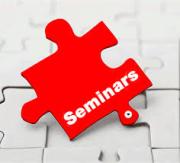
|
|
|
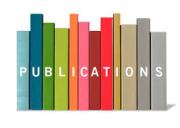
|
|
Publications:
Brocks, J. J., Jarrett, A. J. M., Sirantoine, E., Hallmann, C., Hoshino, Y., and Liyanage, T., 2017. The rise of algae in Cryogenian oceans and the emergence of animals. Nature 548, 578–581.
Schinteie, R. and Brocks, J. J., 2017. Paleoecology of Neoproterozoic hypersaline environments: Biomarker evidence for haloarchaea, methanogens, and cyanobacteria. Geobiology 15, 641-663.
Beghin, J., Guilbaud, R., Poulton, S. W., Gueneli, N., Brocks, J. J., Storme, J.-Y., Blanpiede, C., and Javaux, E. J., 2017. A palaeoecological model for the late Mesoproterozoic – early Neoproterozoic Atar/El Mreïti Group, Taoudeni Basin, Mauritania, northwestern Africa. Precambrian Research 299, 1-14.
William F. Bottke and Marc D. Norman. The Late Heavy Bombardment. Annual Review of Earth and Planetary Sciences (impact factor 10.2) |
|

|
|
College Research Office -
The College Research Office is collecting expressions of interest for ARC Laureate Fellowships (opens 27 September), Future Fellowships (opens 13 October), and Centre of Excellence 2020 (opens 14 May 2018). Please email rses.rm@anu.edu.au to let us know if you are considering an application. We also encourage you to contact candidates for DECRA 2019 (opens 8 January 2018) and put them in touch with our office ASAP. |
|
|
2017 Staff Excellence Awards: nominations open
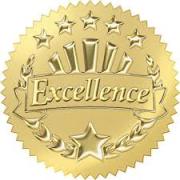
|
|
Have you, a colleague or your team done an amazing job working on a project for the broader benefit of the University community? If so, you're invited to nominate for the 2017 Staff Excellence Awards. >>> Read More
Nominations close at 5pm on Friday 29 September 2017.
|
|
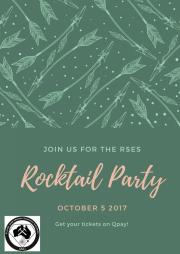
|
|
Rocktail Party 5th October
The Premiere event of the year has arrived, the Research School of Earth Sciences GeoBall!!! This year we have chosen to hold a Rocktail party on the 5th of October.⚒️!T
So are you ready to 'rock' out to some great music and celebrate the 'rockin' year that we have had up at the RSES? Prepared to party the night away with fabulous lecturers and equally as fabulous students?
Make sure that you get tickets here >> EMS Qpay Page:
Early bird tickets are available at $65, snatch them up before they disappear! Tickets are available on our qpay account or our facebook page!
Facebook event page:
Like our Facebook page to get all the updates!! |
|
|
Fieldwork Activities:
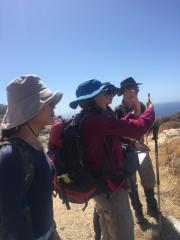
|
|
Student update from Greece.
The last days of the 2017 Field Camp are drawing to a close. Marnie Forster demonstrating sense of shear on a distant structure to RSES students Nini He, Kristin Marris and Reuben Creighton |
|
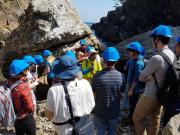
|
|
New Colombo Plan
Fifteen ANU undergraduates are currently in Japan taking part the field-intensive course "Understanding Geological Hazards". This is a joint venture between RSES and the University of Tokyo funded by the Department of Foreign Affairs and Trade through the New Colombo Plan. The course will introduce students to the physical processes that underpin geological hazards and importantly their impact on the peoples and economies of the Indo-Pacific region. Follow #GeoHazardsNCP to keep up to date with the students' activities. |
|
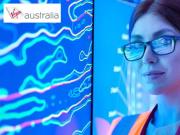
|
|
2017 Travel Grants for Women in STEM
Opportunity for female academics or HDR students to gain funding for travel to “enrich your area of study or academic work on a trip-of-a-lifetime, wherever your professional interests take you”.
If you are female, employed by an Australian university or a research organisation, or you are a PHD student with a STEM related focus you are eligible to apply for the Campus Travel and Virgin Australia 2017 Travel Grant. Applications close Friday 20 October 2017
>>> Read More |
|
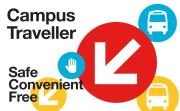
|
|
Free Hail & Ride Bus Service
Beginning on Monday 18th September the Campus Traveller will help ease parking congestion by linking car parking areas with a free and convenient all-day shuttle bus
Download the Campus Traveller route map here, visit the website, or check the FAQ's |
|
|
|